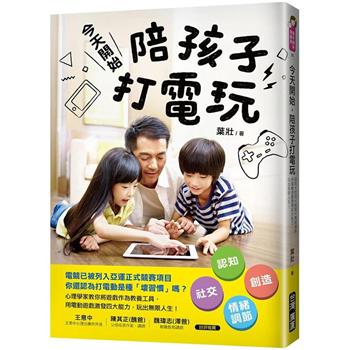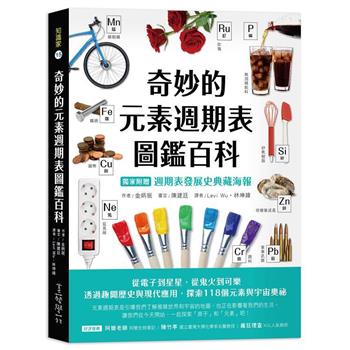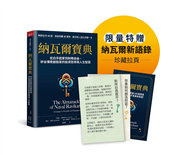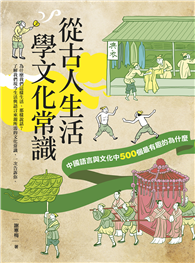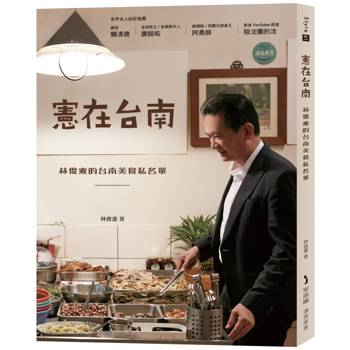本書特色
本書是針對以下三種不同領域的讀者為目標而編纂的:社會科學家、翻譯者和口譯者、專業人士,共彙編了不同領域中的1000個「強大的」漢語詞彙,主要目的是提供與華人交流時極常用的當代詞彙。
本書的目的不是要取代辭典,而是要幫助讀者快速掌握最基本的重要漢語詞彙。
| FindBook |
|
有 1 項符合
Snehal Ajit Ulman的圖書 |
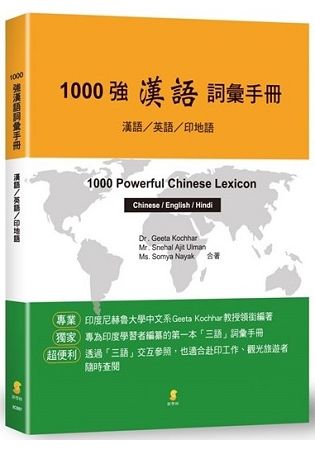 |
$ 270 ~ 288 | 1000強漢語詞彙手冊:漢語/英語/印地語
作者:Geeta Kochhar,Snehal Ajit Ulman,Somya Nayak 出版社:Geeta Kochhar,Snehal Ajit Ulman,Somya Nayak 出版日期:2017-10-31  共 9 筆 → 查價格、看圖書介紹 共 9 筆 → 查價格、看圖書介紹
|
|
|
圖書介紹 - 資料來源:博客來 評分:
圖書名稱:1000強漢語詞彙手冊:漢語/英語/印地語
內容簡介
作者介紹
作者簡介
Dr. Geeta Kochhar
Dr. Geeta Kochhar is currently an Assistant Professor in the Centre for Chinese and South East Asian Studies at the Jawaharlal Nehru University. Dr. Kochhar was trained in Chinese language, is a fluent speaker of Mandarin. For the last 11 years, she has been teaching courses in Chinese language in the university. She has conducted two years advance studies in Chinese language from Chinese universities. She received her PhD from School of International Studies, Jawaharlal Nehru University. She was awarded the Asia Fellowship to undertake nine-month research at Chinese Academy of Social Sciences. Awarded India-China Bilateral Cultural Exchange Scholarship” (Sept 1995 – July 1997) by the Ministry of Human Resource Development, Government of India for advance studies in China. She has co-edited two books on India-China-Nepal Relations and one on China-Nepal relations, presented many papers in National and International Conferences on China, published numerous papers in International Journals, and has a list of articles.
Ms. Somya Nayak
Ms. Somya Nayak is currently serving as an Assistant Professor in the Department of Asian Languages, in The English and Foreign Languages University, Hyderabad. Ms. Nayak has completed her Bachelor’s, Master’s and M.Phil in Chinese Language from Jawaharlal Nehru University. She is fluent in Mandarin, English, Hindi, Bengali and Oriya. She had previously worked in Delhi University, Jawaharlal Nehru University as a guest faculty. Prior to her job she has spent one year in Beijing as Advanced Research Scholar on a joint scholarship from the Ministry of Human Resources Development, India and the China Scholarship Council. Her area of interest is effect of changes on various facets of the Chinese language that occurred as a result of the changes in the society. She has also presented many papers in National and International Conferences on China.
Mr. Snehal Ajit Ulman
Mr. Snehal Ulman is currently a Provisional Ph.D research scholar in the Centre for Chinese and South East Asian Studies at the Jawaharlal Nehru University. He has acquired his Bachelor’s degree from Visva Bharati University, Santiniketan, West-Bengal and his Master’s degree from Jawaharlal Nehru University. He has received his M.Phil degree from Jawaharlal Nehru University. He is also a Junior Research Fellowship holder and currently teaching undergraduate first year students in Jawaharlal Nehru University. He was awarded joint scholarship from Government of China and the Ministry of Human Resource Development to study in China for a year (Sept 2012 – July 2013).
Dr. Geeta Kochhar
Dr. Geeta Kochhar is currently an Assistant Professor in the Centre for Chinese and South East Asian Studies at the Jawaharlal Nehru University. Dr. Kochhar was trained in Chinese language, is a fluent speaker of Mandarin. For the last 11 years, she has been teaching courses in Chinese language in the university. She has conducted two years advance studies in Chinese language from Chinese universities. She received her PhD from School of International Studies, Jawaharlal Nehru University. She was awarded the Asia Fellowship to undertake nine-month research at Chinese Academy of Social Sciences. Awarded India-China Bilateral Cultural Exchange Scholarship” (Sept 1995 – July 1997) by the Ministry of Human Resource Development, Government of India for advance studies in China. She has co-edited two books on India-China-Nepal Relations and one on China-Nepal relations, presented many papers in National and International Conferences on China, published numerous papers in International Journals, and has a list of articles.
Ms. Somya Nayak
Ms. Somya Nayak is currently serving as an Assistant Professor in the Department of Asian Languages, in The English and Foreign Languages University, Hyderabad. Ms. Nayak has completed her Bachelor’s, Master’s and M.Phil in Chinese Language from Jawaharlal Nehru University. She is fluent in Mandarin, English, Hindi, Bengali and Oriya. She had previously worked in Delhi University, Jawaharlal Nehru University as a guest faculty. Prior to her job she has spent one year in Beijing as Advanced Research Scholar on a joint scholarship from the Ministry of Human Resources Development, India and the China Scholarship Council. Her area of interest is effect of changes on various facets of the Chinese language that occurred as a result of the changes in the society. She has also presented many papers in National and International Conferences on China.
Mr. Snehal Ajit Ulman
Mr. Snehal Ulman is currently a Provisional Ph.D research scholar in the Centre for Chinese and South East Asian Studies at the Jawaharlal Nehru University. He has acquired his Bachelor’s degree from Visva Bharati University, Santiniketan, West-Bengal and his Master’s degree from Jawaharlal Nehru University. He has received his M.Phil degree from Jawaharlal Nehru University. He is also a Junior Research Fellowship holder and currently teaching undergraduate first year students in Jawaharlal Nehru University. He was awarded joint scholarship from Government of China and the Ministry of Human Resource Development to study in China for a year (Sept 2012 – July 2013).
目錄
Preface III
How to use this book VII
社會詞彙/社会词汇/
Social Terminology/सामाजिक शब्दावली 1
文化/Culture/संस्कृति 2
婚禮/Marriage Ceremony/शादी / विवाह 4
經濟/Economy/अर्थव्यवस्था 5
法律/Law/कानून 11
哲學/Philosophy/तत्त्वज्ञान 14
社會/Society/समाज 17
報紙/Newspaper/समाचारपत्र 20
商業詞彙/商业词汇/
Business Terminology/व्यापार शब्दावली 25
組織/Organizations/संगठन 26
職位/Position/पद 29
金融/Finance/वित्त 31
公司/Companies/कंपनी 36
其他/Others/अन्य 46
科技詞彙/科技词汇/
Technological Terminology/प्रौद्योगिकी शब्दावली 47
手機/Mobile Phone/मोबाइल फोन 48
電腦/Computer/संगणक 52
網路/Networking/नेटवर्किंग 55
程序/Processes/संगणकीय प्रक्रिया 57
通訊/Connectivity/संयोजकता 59
病毒/Viruses/वायरस 63
環境詞彙/环境词汇/
Environmental Terminology/पर्यवार्नीय शब्दावली 65
環境/Environment/पर्यावरण 66
宇宙詞彙/宇宙词汇/
Cosmic Terminology/ब्रह्मांडीय शब्दावली 71
宇宙/Cosmos/ब्रह्मांड 72
國際關係/国际关系/
International Relations/अंतर्राष्ट्रीय सम्बन्ध 77
外交/Foreign Policy/कूटनीति 78
組織/Groups/संगठन 81
協議/Agreements/समझौते 92
恐怖組織/Terrorist Organisations/आतंकवादी संगठन 95
軍事詞彙/军事词汇/
Military Terminology/सैनिक शब्दावली 113
軍事/Military/सैन्य 114
陸軍/Army/सेना 119
海軍/Navy/नौसेना 120
空軍/Air Force/वायु सेना 123
協議/Treaties/संधि 126
政治詞彙/政治词汇/
Political Terminology/राजनीतिक शब्दावली 135
職位/Posts/पद 136
對外關係/Foreign Relations/विदेशी सम्बन्ध 138
組織/Organizations/संगठन 143
理念/Ideals/आदर्श 148
英文索引/Index of English 164
印地文索引/Index of Hindi 180
附錄一:天城文印地語語音/
Appendix I: Devnagari Hindi Phonetics 194
How to use this book VII
社會詞彙/社会词汇/
Social Terminology/सामाजिक शब्दावली 1
文化/Culture/संस्कृति 2
婚禮/Marriage Ceremony/शादी / विवाह 4
經濟/Economy/अर्थव्यवस्था 5
法律/Law/कानून 11
哲學/Philosophy/तत्त्वज्ञान 14
社會/Society/समाज 17
報紙/Newspaper/समाचारपत्र 20
商業詞彙/商业词汇/
Business Terminology/व्यापार शब्दावली 25
組織/Organizations/संगठन 26
職位/Position/पद 29
金融/Finance/वित्त 31
公司/Companies/कंपनी 36
其他/Others/अन्य 46
科技詞彙/科技词汇/
Technological Terminology/प्रौद्योगिकी शब्दावली 47
手機/Mobile Phone/मोबाइल फोन 48
電腦/Computer/संगणक 52
網路/Networking/नेटवर्किंग 55
程序/Processes/संगणकीय प्रक्रिया 57
通訊/Connectivity/संयोजकता 59
病毒/Viruses/वायरस 63
環境詞彙/环境词汇/
Environmental Terminology/पर्यवार्नीय शब्दावली 65
環境/Environment/पर्यावरण 66
宇宙詞彙/宇宙词汇/
Cosmic Terminology/ब्रह्मांडीय शब्दावली 71
宇宙/Cosmos/ब्रह्मांड 72
國際關係/国际关系/
International Relations/अंतर्राष्ट्रीय सम्बन्ध 77
外交/Foreign Policy/कूटनीति 78
組織/Groups/संगठन 81
協議/Agreements/समझौते 92
恐怖組織/Terrorist Organisations/आतंकवादी संगठन 95
軍事詞彙/军事词汇/
Military Terminology/सैनिक शब्दावली 113
軍事/Military/सैन्य 114
陸軍/Army/सेना 119
海軍/Navy/नौसेना 120
空軍/Air Force/वायु सेना 123
協議/Treaties/संधि 126
政治詞彙/政治词汇/
Political Terminology/राजनीतिक शब्दावली 135
職位/Posts/पद 136
對外關係/Foreign Relations/विदेशी सम्बन्ध 138
組織/Organizations/संगठन 143
理念/Ideals/आदर्श 148
英文索引/Index of English 164
印地文索引/Index of Hindi 180
附錄一:天城文印地語語音/
Appendix I: Devnagari Hindi Phonetics 194
序
序
Preface
This book is a compilation of 1000 powerful Chinese lexicon from different fields. The main purpose of this book is to serve as a must know Contemporary vocabulary to deal with the Chinese. This book is produced keeping three set of people in mind:
本書彙編了不同領域中的1000個「強大的」漢語詞彙。本書的主要目的是提供與華人交流時極常用的當代詞彙。本書是針對以下三種不同領域的讀者為目標而編纂的:
I. Social Scientist: It has been increasingly felt by Indian social science researchers that they often hit the bottleneck of knowing adequate vocabularies to conduct research on China. These master set of vocabularies provided here will equip the researchers to understand the area, find out area related material, and identify the research works or news items broadly touching upon their areas of interest. Hence, this book will greatly help the social science researchers in India to know the amount of literature in their area of research.
一 社會科學家:印度社會科學研究者越來越認識到,進行中國研究時經常面臨詞彙上的障礙。本書的主要詞彙能幫助研究者瞭解其研究範圍內的相關詞彙,找出與該範疇有關的材料、相關資訊和研究報告。因此,本書有助於印度的社會科學研究者瞭解自己研究領域內的文獻及內容。
II. Translators and Interpreters: In India, even after learning years of Chinese, it is found that students lack knowledge to do interpretation. The reason mainly is that they have to work in diverse areas and their knowledge of vocabulary is abysmal, as most of the courses taught in the universities relate to literature and culture. Hence, even if basic conversation is not a problem for these students, they are unable to cope with high level interpretation jobs that require a set of vocabularies mainly relating to political, economic, and foreign policy fields. This book will help them to have a mastery of certain essential vocabularies for all interpretation jobs not pertaining to trade and machines.
二 翻譯者和口譯者:在印度,即使學了多年的中文,學生還是缺乏口譯的知識。其原因在於他們雖然從事各種各樣領域的翻譯工作,但他們的詞彙知識十分有限。 這是因為在大多數的大學外語課程中僅涉及文學與文化內容。因此,即使對這些學生來說基本對話不成問題,但他們仍無法應付高水準的翻譯工作,這些工作多半需要更多政治、經濟和外交政策等領域有關的專門詞彙。本書將有助於他們在慣性、機械式的翻譯之外,掌握不同領域的基本詞彙。
III. Professionals: Increasingly people from various walks of life are having engagement with the Chinese at different levels. There are businessmen, politicians, policy makers, researchers, scholars, journalists, officials from government bodies etc. It is desirable for them to have a basic set of vocabularies that help them to take up issues of discussion and also identify the relevant people in the area. For all those, who would want to have interaction with the Chinese knowing the most common set of vocabularies, this book will come handy.
三 專業人士:越來越多的社會各界人士與華人進行交往,有商人、政治家、政策制定者、研究者、學者、記者、政府機構的官員等。他們為了從事相關交流而需要一套基本的詞彙知識,以便與同一領域內的相關人員進行討論。對於這些想以常用詞彙與華人交流的人來說,本書非常有用。
It must be mentioned that this book is just a beginning and not the end as any language including Chinese is developing each day. There are many new terms added each day to the already existing volume of lexicon. The purpose of this book is not to act as a substitute for dictionaries, but get some quick mastery on important basic vocabularies which are essentially used in Chinese language. The book helps to get the meaning of words in three different languages English, Chinese, and Hindi; however, it is not a traveller’s guide.
必須要指出的一點是,本書只是一個開頭,而不是結束,因為任何一門語言,包括中文,是每天都在不斷地改變和發展的。每天都有許多新詞彙加入到已有的辭典裡。本書的目的不是要取代辭典,而是要幫助讀者快速掌握最基本的重要漢語詞彙。本書藉由三種不同的語言:英文、中文和印地文來翻譯詞彙的意義;不過,這不是一本旅行者指南。
The strong point of this book is that it also helps those who know Hindi or need vocabularies in Hindi. Hindi now becoming essential at the national level, there is a growing need for Chinese language knowing people as well to know certain terms in Hindi. This book will help overcome this flaw in our university teaching, whereby nothing is taught in Hindi language. Along with helping the Chinese understand the vocabularies in Indian local language.
本書的特點之一是能夠幫助那些懂印地語,或需要印地語詞彙的人。印地語在現今印度全國層面上,已是十分重要的一門語言,人們越來越需要會講漢語、並瞭解印地語的相關人員。在不使用印地語授課的情況下,本書將有助於克服印度大學教學中的缺陷。同時,亦有助於華人瞭解印度當地語言的相關詞彙。
Preface
This book is a compilation of 1000 powerful Chinese lexicon from different fields. The main purpose of this book is to serve as a must know Contemporary vocabulary to deal with the Chinese. This book is produced keeping three set of people in mind:
本書彙編了不同領域中的1000個「強大的」漢語詞彙。本書的主要目的是提供與華人交流時極常用的當代詞彙。本書是針對以下三種不同領域的讀者為目標而編纂的:
I. Social Scientist: It has been increasingly felt by Indian social science researchers that they often hit the bottleneck of knowing adequate vocabularies to conduct research on China. These master set of vocabularies provided here will equip the researchers to understand the area, find out area related material, and identify the research works or news items broadly touching upon their areas of interest. Hence, this book will greatly help the social science researchers in India to know the amount of literature in their area of research.
一 社會科學家:印度社會科學研究者越來越認識到,進行中國研究時經常面臨詞彙上的障礙。本書的主要詞彙能幫助研究者瞭解其研究範圍內的相關詞彙,找出與該範疇有關的材料、相關資訊和研究報告。因此,本書有助於印度的社會科學研究者瞭解自己研究領域內的文獻及內容。
II. Translators and Interpreters: In India, even after learning years of Chinese, it is found that students lack knowledge to do interpretation. The reason mainly is that they have to work in diverse areas and their knowledge of vocabulary is abysmal, as most of the courses taught in the universities relate to literature and culture. Hence, even if basic conversation is not a problem for these students, they are unable to cope with high level interpretation jobs that require a set of vocabularies mainly relating to political, economic, and foreign policy fields. This book will help them to have a mastery of certain essential vocabularies for all interpretation jobs not pertaining to trade and machines.
二 翻譯者和口譯者:在印度,即使學了多年的中文,學生還是缺乏口譯的知識。其原因在於他們雖然從事各種各樣領域的翻譯工作,但他們的詞彙知識十分有限。 這是因為在大多數的大學外語課程中僅涉及文學與文化內容。因此,即使對這些學生來說基本對話不成問題,但他們仍無法應付高水準的翻譯工作,這些工作多半需要更多政治、經濟和外交政策等領域有關的專門詞彙。本書將有助於他們在慣性、機械式的翻譯之外,掌握不同領域的基本詞彙。
III. Professionals: Increasingly people from various walks of life are having engagement with the Chinese at different levels. There are businessmen, politicians, policy makers, researchers, scholars, journalists, officials from government bodies etc. It is desirable for them to have a basic set of vocabularies that help them to take up issues of discussion and also identify the relevant people in the area. For all those, who would want to have interaction with the Chinese knowing the most common set of vocabularies, this book will come handy.
三 專業人士:越來越多的社會各界人士與華人進行交往,有商人、政治家、政策制定者、研究者、學者、記者、政府機構的官員等。他們為了從事相關交流而需要一套基本的詞彙知識,以便與同一領域內的相關人員進行討論。對於這些想以常用詞彙與華人交流的人來說,本書非常有用。
It must be mentioned that this book is just a beginning and not the end as any language including Chinese is developing each day. There are many new terms added each day to the already existing volume of lexicon. The purpose of this book is not to act as a substitute for dictionaries, but get some quick mastery on important basic vocabularies which are essentially used in Chinese language. The book helps to get the meaning of words in three different languages English, Chinese, and Hindi; however, it is not a traveller’s guide.
必須要指出的一點是,本書只是一個開頭,而不是結束,因為任何一門語言,包括中文,是每天都在不斷地改變和發展的。每天都有許多新詞彙加入到已有的辭典裡。本書的目的不是要取代辭典,而是要幫助讀者快速掌握最基本的重要漢語詞彙。本書藉由三種不同的語言:英文、中文和印地文來翻譯詞彙的意義;不過,這不是一本旅行者指南。
The strong point of this book is that it also helps those who know Hindi or need vocabularies in Hindi. Hindi now becoming essential at the national level, there is a growing need for Chinese language knowing people as well to know certain terms in Hindi. This book will help overcome this flaw in our university teaching, whereby nothing is taught in Hindi language. Along with helping the Chinese understand the vocabularies in Indian local language.
本書的特點之一是能夠幫助那些懂印地語,或需要印地語詞彙的人。印地語在現今印度全國層面上,已是十分重要的一門語言,人們越來越需要會講漢語、並瞭解印地語的相關人員。在不使用印地語授課的情況下,本書將有助於克服印度大學教學中的缺陷。同時,亦有助於華人瞭解印度當地語言的相關詞彙。
|
